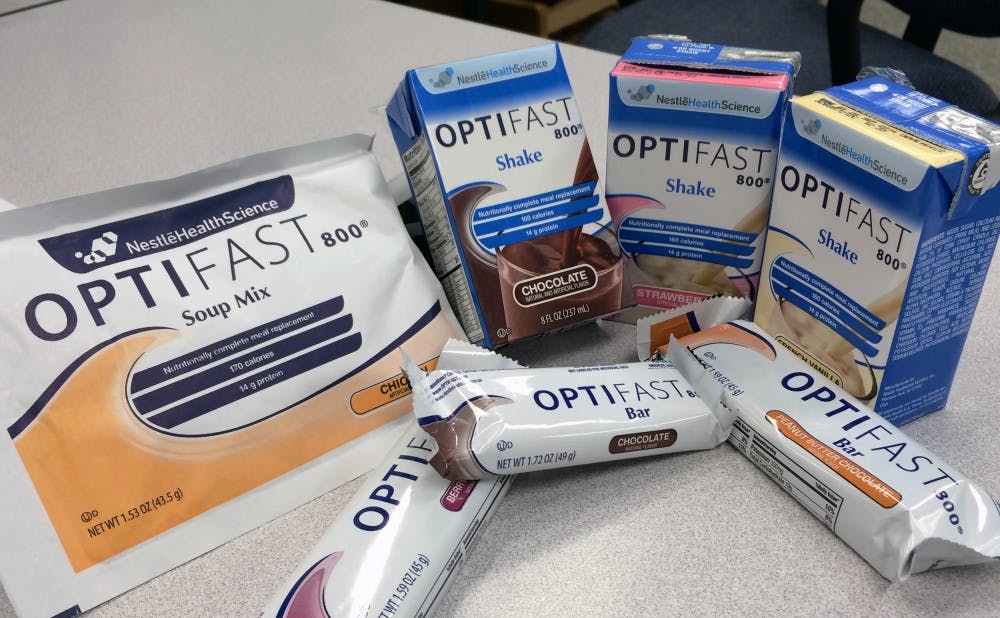The Duke Diet and Fitness Center is promoting an approximately 800-calories-a-day meal replacement program for people unable to lose weight through other dieting means.
OPTIFAST is a calorie-restrictive diet in mostly liquid form created by Nestle—a corporation that produces nutrition, health and wellness products. Patients are typically given five meals a day consisting of shakes, soups and bars that contain approximately 160 calories, 20 grams of carbohydrates and 14 grams of protein each. Duke Diet and Fitness offers both nine- and 18-week programs during which patients are medically supervised by doctors and other staff.
“Everyone knows someone who has lost a lot of weight on liquid diets just to gain it right back,” said Elisabetta Politi, nutrition director at the Duke Diet and Fitness Center.
OPTIFAST’s multidisciplinary approach to emphasizing lifestyle changes makes it different from these other diets, Politi said. The program involves thorough medical evaluations, individual meetings with dieticians and weekly support group meetings led by psychologists, dieticians and exercise physiologists. She added that she would not recommend someone consuming below 1200-1500 calories a day without medical supervision.
“I’ve had very obese clients who said that they thought they were going to die of hunger,” Politi said. “But the truth of the matter is in stimuli narrowing—when you don’t have a lot of food to choose from, your appetite decreases.”
On average, patients lose more than 50 pounds and experience an 11 percent decrease in blood pressure and 14 percent decrease in cholesterol, according to Nestle Health Science
Dr. Ronald Sha, medical director and interim program director of the Diet and Fitness Center, could not be reached for comment in time for publication.
Both the nine- and 18-week programs consist of a period of meal replacement and a subsequent transition period during which patients learn how to resume eating real food. The key for someone to maintain their weight during this transition period is to add the meals back very gradually and eat food that is lowfat and well-balanced, Politi said.
She added that OPTIFAST is not for everyone but is designed primarily for those who have found extreme difficulty dieting with real food. The perfect candidate, Politi said, is definitely not a foodie. The diet is recommended for those who do not have a lot of time to cook or clean.
“I would recommend this diet to someone who needs a vacation from food,” she said. "Sometimes people get into vicious, mindless eating cycles and need to take a break in order to reevaluate their relationship with food and assess their eating habits.”
Ginger Anderson, a 53-year old mother and native of Durham, experienced dramatic weight loss success with the OPTIFAST program. Anderson gained weight in her 40s and previously tried other programs such as Jenny Craig and Weight Watchers with little success.
“I needed something simple that involved fewer choices,” Anderson said. “When you don’t have to make choices, it gives you a blank slate to start new habits.”
Due to her high blood pressure, Anderson found the medical supervision to be a vital part of the process. She also found the group sessions to be helpful throughout the transition periods.
In follow-up studies conducted on patients two years after completing the program, 78 percent of men and 60 percent of women maintained medically significant weight loss, according to Nestle. After five years, more than 45 percent of patients maintained medically significant weight loss.
Although Anderson has been off the OPTIFAST program for nearly two years, she continues to follow a Weight Watchers diet in order to monitor her carbohydrate and caloric intake. She credits the OPTIFAST program for kickstarting her total weight loss—approximately 70 pounds to date.
“When you stop consuming excess salts and sugars and then go back to your normal routine, you find that you stop craving them,” Anderson said. “Your body doesn’t need it.”
Duke's nine-week OPTIFAST program costs $2,200, and the 18-week program costs $3,950. Duke employees are eligible for a 10 percent discount.
Get The Chronicle straight to your inbox
Signup for our weekly newsletter. Cancel at any time.

